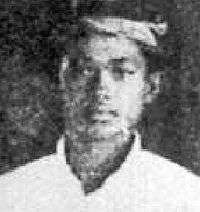Salipada Pendatun
| Datu Salipada Khalid Pendatun | |
|---|---|
|
Salipada K. Pendatun in 1927 | |
| Assemblyman at the Interim Batasang Pambansa | |
|
In office 1978–1985 | |
| Senator of the Philippines | |
|
In office 28 May 1946 – 30 December 1951 | |
|
In office 30 December 1969 – 23 September 1972 | |
| Congressman of Cotabato Province | |
|
In office 1957–1963 | |
| Provincial Governor of Cotabato Province | |
|
In office 1945–1945 | |
| President | Sergio Osmeña |
| Personal details | |
| Born |
December 3, 1912 Pikit, Cotabato Province, Philippine Islands |
| Died |
January 26, 1985 (aged 72) philippine heart center, east ave, quezon city, philippines |
| Nationality | Filipino |
| Spouse(s) | Aida S. Farrales |
| Children | Bai Moniera, Bai Zamrod, Bai Mariam, and Datu Salipada Khalid, Jr. |
| Residence | Cotabato province |
| Alma mater | University of the Philippines College of Law |
| Occupation | Lawyer |
| Profession | Politician |
| Religion | Islam |
|
Military career | |
| Nickname(s) | Sali |
| Allegiance |
|
| Service/branch | Philippine Army, Philippine Constabulary |
| Years of service | 1942–1945 |
| Rank | Brigadier General |
| Commands held | Armed Forces of the Philippines |
| Battles/wars | |
Datu Salipada Khalid Pendatun was a Philippine lawyer, military officer, and a statesman, being the first Filipino Muslim in history to hold these offices. He died on May 16, 1985 in Cotabato Province.
Contributions
He fought against the Japanese. Pendatun was from Cotabato-Maguindanao. The group he formed was called the Bolo Battalion, which evolved into the larger group, Muslim-Christian Guerrilla Movement and later, the Cotabato-Bukidnon Force.[1]
During his time as a politician, especially when he was the governor of the then undivided Cotabato province, Cotabato province was by then the most prosperous province in the country, serving it as its "rice basket", with its capital bearing the same name was second only to Davao City as the most populous and economically prosperous city in Mindanao. Several towns were born in the province, and a number of them, i.e. Kidapawan, Buayan (now General Santos City), Marbel, Tacurong, and some others flourished and became economically prosperous that they become cities several years later. The province was also exceptionally peaceful before the Muslim insurgencies in Mindanao in the 1970s.
Legacy
The town of General Salipada K. Pendatun, Maguindanao was named after him.
References
- ↑ Moslem-Christian Guerrillas of Mindanao By Uldarico Baclagon with foreword by then Defense Secretary Fidel Ramos
